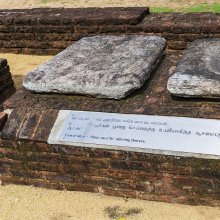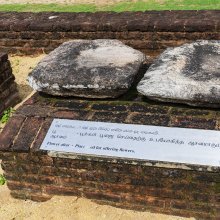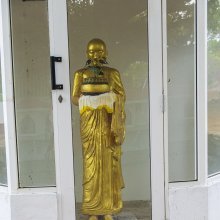Mal, Māḷ: 13 definitions
Introduction:
Mal means something in Hinduism, Sanskrit, the history of ancient India, Hindi, biology, Tamil. If you want to know the exact meaning, history, etymology or English translation of this term then check out the descriptions on this page. Add your comment or reference to a book if you want to contribute to this summary article.
The Sanskrit term Māḷ can be transliterated into English as Mal or Mali, using the IAST transliteration scheme (?).
Images (photo gallery)
(+12 more images available)
India history and geography
Source: Institut Français de Pondichéry: The Shaivite legends of KanchipuramMāl (மால்) (in Tamil) refers to Kṛṣṇa in Sanskrit, and represents one of the proper nouns mentioned in the Kanchipuranam, which narrates the Shaivite Legends of Kanchipuram—an ancient and sacred district in Tamil Nadu (India). The Kanchipuranam (mentioning Māl) reminds us that Kanchipuram represents an important seat of Hinduism where Vaishnavism and Shaivism have co-existed since ancient times.

The history of India traces the identification of countries, villages, towns and other regions of India, as well as mythology, zoology, royal dynasties, rulers, tribes, local festivities and traditions and regional languages. Ancient India enjoyed religious freedom and encourages the path of Dharma, a concept common to Buddhism, Hinduism, and Jainism.
Biology (plants and animals)
Source: Google Books: CRC World Dictionary (Regional names)1) Mal in India is the name of a plant defined with Borassus flabellifer in various botanical sources. This page contains potential references in Ayurveda, modern medicine, and other folk traditions or local practices It has the synonym Lontarus domestica Gaertn., nom. superfl. (among others).
2) Mal is also identified with Cinnamomum verum It has the synonym Camphora mauritiana Lukman. (etc.).
3) Mal is also identified with Panicum antidotale It has the synonym Paspalum miliare (Lam.) K. Schum. & Hollrung, nom. illeg., non Paspalum miliare Spreng. (etc.).
Example references for further research on medicinal uses or toxicity (see latin names for full list):
· Flora de Filipinas (1837)
· Enumeratio Plantarum Zeylaniae (1864)
· FBI
· Revised Handbook to the Flora of Ceylon (1900)
· Fl. Kaiser Wilhelms Land (1889)
· Fl. Cochinch. (1790)
If you are looking for specific details regarding Mal, for example pregnancy safety, extract dosage, diet and recipes, chemical composition, health benefits, side effects, have a look at these references.

This sections includes definitions from the five kingdoms of living things: Animals, Plants, Fungi, Protists and Monera. It will include both the official binomial nomenclature (scientific names usually in Latin) as well as regional spellings and variants.
Languages of India and abroad
Sanskrit dictionary
Source: DDSA: The practical Sanskrit-English dictionaryMal (मल्).—1 Ā., 1 U. (malate, malayati-te) To hold, possess.
Source: Cologne Digital Sanskrit Dictionaries: Shabda-Sagara Sanskrit-English DictionaryMal (मल्).—r. 1st cl. (malate) r. 10th cl. (malayati) 1. To hold. 2. To wear. 3. To stick.
Source: Cologne Digital Sanskrit Dictionaries: Benfey Sanskrit-English DictionaryMal (मल्).—mall Mall, i. 1, [Ātmanepada.], and bhala Mal, 1. 10, malaya, or malāpaya, [Parasmaipada.] To hold.
Source: Cologne Digital Sanskrit Dictionaries: Monier-Williams Sanskrit-English DictionaryMal (मल्):—(cf. √mall) [class] 1. [Ātmanepada] [class] 10. [Parasmaipada] malate, malayati, to hold, possess, [Dhātupāṭha xiv, 22];—[xxxv, 84; Vopadeva]
Source: Cologne Digital Sanskrit Dictionaries: Yates Sanskrit-English DictionaryMal (मल्):—(ṅa) malate 1. d. (ka) malayati 10. a. To hold; to wear; to stick.
Source: DDSA: Paia-sadda-mahannavo; a comprehensive Prakrit Hindi dictionary (S)Mal (मल्) in the Sanskrit language is related to the Prakrit words: Mala, Māla.
[Sanskrit to German]
Sanskrit, also spelled संस्कृतम् (saṃskṛtam), is an ancient language of India commonly seen as the grandmother of the Indo-European language family (even English!). Closely allied with Prakrit and Pali, Sanskrit is more exhaustive in both grammar and terms and has the most extensive collection of literature in the world, greatly surpassing its sister-languages Greek and Latin.
Hindi dictionary
Source: DDSA: A practical Hindi-English dictionaryMal in Hindi refers in English to:—(nm) faeces, stool, excrement; sewage; rubbish, filth, dirt; ~[kupa] a sink; ~[tyaga] excretion of faeces; ~[dvara] the anus; —[pariksha] stool test; ~[patra] a commode; —[masa] an intercalary month; -[mutra] urine and faeces, excrement; [rodhaka] constipative; -[visarjana] excretion of facces; ~[shuddhi] purgation..—mal (मल) is alternatively transliterated as Mala.
...
Kannada-English dictionary
Source: Alar: Kannada-English corpusMal (ಮಲ್):—[noun] a thin, soft muslin.
Kannada is a Dravidian language (as opposed to the Indo-European language family) mainly spoken in the southwestern region of India.
Tamil dictionary
Source: DDSA: University of Madras: Tamil LexiconMal (மல்) noun < மல்கு-. [malku-.]
1. Fertility, richness; வளம். மற்றுன்று மாமலரிட்டு [valam. marrunru mamalarittu] (திருக்கோவையார் [thirukkovaiyar] 178). (சூடாமணிநிகண்டு [sudamaninigandu])
2. Income; வருவாய். (சூடாமணிநிகண்டு) [varuvay. (sudamaninigandu)]
--- OR ---
Mal (மல்) noun < malla.
1. Strength; வலிமை. (பிங்கலகண்டு) [valimai. (pingalagandu)]
2. Wrestling, boxing, as bringing into play one’s strength; மற்றொழில். மல்ல லைத் தெழுந்து வீங்கி [marrozhil. malla laith thezhunthu vingi] (சீவகசிந்தாமணி [sivagasindamani] 268).
3. See மல்லன் [mallan],
1. மல்லொடு கஞ்சனுந் துஞ்சவென்ற மணிவண்ணன் [mallodu kanchanun thunchavenra manivannan] (நாலாயிர திவ்யப்பிரபந்தம் பெரியதி. [nalayira thivyappirapandam periyathi.] 11, 2, 3).
4. A dance of Kṛṣṇa after wrestling with and vanquishing Bāṇāsura, one of 11 kūttu, q.v.; கூத்துப்பதினொன்றனுள் கண்ணபிரான் மல்லனாய்ப் பாணாசுரனை வென்றாடிய கூத்துவகை. (பிங்கலகண்டு) [kuthuppathinonranul kannapiran mallanayp panasuranai venradiya kuthuvagai. (pingalagandu)]
5. Robustness, stoutness, corpulence; பருமை. [parumai.] (J.)
6. See மல்லுச்சட்டம். [malluchattam.] Local usage
--- OR ---
Mal (மல்) noun < Urdu mal-mal. Mull; muslin; ஒருவகைத் துகில். [oruvagaith thugil.]
--- OR ---
Māl (மால்) [māl(lu)tal] 3 intransitive verb To be confused, perturbed; மயங்குதல். மான்று வேட் டெழுந்த செஞ்செவி யெருவை [mayanguthal. manru ved dezhuntha senchevi yeruvai] (அகநா. [agana.] 3).
--- OR ---
Māl (மால்) noun < மால்¹-. [mal¹-.]
1. Illusion, delusion, aberration of mind; dullness; stupor; confusion; மயக்கம். பரேரம் புழகுடன் மாலங் குடைய மலிவன மறுகி [mayakkam. pareram puzhagudan malang kudaiya malivana marugi] (பத்துப்பாட்டு: குறிஞ்சிப்பாட்டு [pathuppattu: kurinchippattu] 96).
2. Desire; ஆசை. (பிங்கலகண்டு) என் பேய்மன மால் கொண்டதே [asai. (pingalagandu) en peymana mal kondathe] (திருநூற்றந்தாதி [thirunurrandathi] 1).
3. Love; lust; காமம். மடப்பிடி கண்டு வயக்கரி மாலுற்று [kamam. madappidi kandu vayakkari malurru] (பரிபாடல் [paripadal] 10, 42).
4. Blackness; கருமை. மால்கடல் [karumai. malkadal] (பத்துப்பாட்டு: பெரும்பாணாற்றுப்படை [pathuppattu: perumbanarruppadai] 487). (பிங்கலகண்டு [pingalagandu])
--- OR ---
Māl (மால்) noun cf. mahat.
1. Greatness; பெருமை. (பிங்கலகண்டு) சினமால் விடையுடையான் [perumai. (pingalagandu) sinamal vidaiyudaiyan] (திருவாசகம் [thiruvasagam] 34, 3).
2. Great man; பெருமையுடையவன். மாமஞ்ஞை யூர்ந்து நின்றமால் [perumaiyudaiyavan. mamajnai yurnthu ninramal] (சீவகசிந்தாமணி [sivagasindamani] 286).
3. cf. māla. Viṣṇu; திருமால். நீர் செல நிமிர்ந்த மாஅல் போல [thirumal. nir sela nimirntha maal pola] (பத்துப்பாட்டு: முல்லைப்பாட்டு [pathuppattu: mullaippattu] 3).
4. Arhat; அருகன். இன்பக் கடலாக்கித் தரு மாலை [arugan. inpag kadalakkith tharu vaithiya malaiyagarathi] (சீவகசிந்தாமணி [sivagasindamani] 961). (சூடாமணிநிகண்டு [sudamaninigandu])
5. Indra; இந்திரன். தன்றிரு மகனெனப் பெற்ற மால் [inthiran. thanriru maganenap perra mal] (குமரகுருபரசுவாமிகள் முத்து. காப். [kumaraguruparasuvamigal muthu. kap.] 6). (பிங்கலகண்டு [pingalagandu])
6. Wind; காற்று. (பிங்கலகண்டு) [karru. (pingalagandu)]
7. Mercury; புதன். (பிங்கலகண்டு) [puthan. (pingalagandu)]
8. Cōḻa king; சோழன். (பிங்கலகண்டு) [sozhan. (pingalagandu)]
9. Mountain; வைத்திய மலையகராதி (அகராதி நிகண்டு) [vaithiya malaiyagarathi (agarathi nigandu)]
10. Plenty; fertility; வளமை. (அகராதி நிகண்டு) [valamai. (agarathi nigandu)]
11. Antiquity; பழமொழிைமை. (அகராதி நிகண்டு) [pazhaimai. (agarathi nigandu)]
12. Cloud; மேகம். (பிங்கலகண்டு) சிலைமா லுருமு [megam. (pingalagandu) silaima lurumu] (தஞ்சைவாணன் கோவை [thanchaivanan kovai] 164).
13. See மால்பு. (பிங்கலகண்டு) [malpu. (pingalagandu)]
14. A plant that grows only in hot and dry places; விஷ்ணுகரந்தை. (வைத்திய மூலிகை) [vishnugaranthai. (vaithiya muligai)]
--- OR ---
Māl (மால்) [māl(lu)tal] 3 intransitive verb < மால்³. [mal³.] To be magnified, glorified; மாட்சிப்படுதல். மான்ற பூண்முலையினாள் [madsippaduthal. manra punmulaiyinal] (காஞ்சிப்புராணம் திருக்கண். [kanchippuranam thirukkan.] 174).
--- OR ---
Māl (மால்) noun < Arabic māl.
1. Wooden mould for forming the mouldings of a pillar or cornice of wall; எழுதகக்கருவி. [ezhuthagakkaruvi.] (W.)
2. Mould for making bricks; செங்கற்கட்டளைக் கொத்து [sengarkattalai.] Local usage
3. Brick-kiln; காளவாய். [kalavay.] Local usage
4. Form, plan, fashion; மாதிரி. [mathiri.] (W.)
5. Demarcation, limit; எல்லை. [ellai.] (W.)
6. A kind of net; வலைவகை. [valaivagai.] (W.)
7. Stable, stall; இலாயம். [ilayam.] (W.)
8. Quit-rent; அரசிறைவகை. [arasiraivagai.] (W.)
9. Property; சொத்து. [sothu.]
--- OR ---
Māl (மால்) [māl(lu)tal] 5 intransitive verb < மால்⁵. [mal⁵.] To form mouldings on a pillar or wall; எழுதகம் அமைத்தல். மால்கிறேன், மாலினேன். [ezhuthagam amaithal. malkiren, malinen.] (W.)
--- OR ---
Māl (மால்) noun < Arabic mahāll. Palace; அரண்மனை. திருமலைநாயக்கர்மால். [aranmanai. thirumalainayakkarmal.]
--- OR ---
Māḷ (மாள்) [māḷ(ḷu)tal] 2 intransitive verb [K. māl, M. māḷguga.]
1. To die; சாதல். வஞ்ச முண் மையேன் மாண்டிலேன் [sathal. vancha mun maiyen mandilen] (திருவாசகம் [thiruvasagam] 5, 93).
2. To perish; அழிதல். அனுபவித்தாலும் மாளாதபடியான பாபங்கள் [azhithal. anupavithalum malathapadiyana papangal] (ஈடு-முப்பத்தாறுயிரப்படி [idu-muppatharuyirappadi], 4, 7, 3).
3. To be exhausted, expended or finished; கழிதல். மாளா வின்ப வெள்ளம் [kazhithal. mala vinpa vellam] (நாலாயிர திவ்யப்பிரபந்தம் திருவாய்மொழி [nalayira thivyappirapandam thiruvaymozhi] 4, 7, 2).
4. To be within one’s ability; இயலுதல். அது செய்ய மாளாது. [iyaluthal. athu seyya malathu.]
--- OR ---
Māl (மால்) noun < Arabic māl. Property; wealth; செல்வம். [selvam.] (P. T. L.)
Tamil is an ancient language of India from the Dravidian family spoken by roughly 250 million people mainly in southern India and Sri Lanka.
See also (Relevant definitions)
Starts with (+2096): Maala, Mal bhindi, Mal de ojos, Mal kangani, Mal leo, Mal saapha, Mal tata, Mal-ankuri, Mal-ghanti, Mal-kangni, Mal-kangni-ke-binj, Mal-kankni, Mal-karvi, Mal-leo, Mal-mara, Mal-naregam, Mal-pakalatcumi, Mala, Mala buru, Mala Ghalanem.
Ends with (+253): A-mal, Akhamal, Akhemal, Alakutemal, Allamal, Amal, Amamal, Ammal, Animal, Aquatic animal, Areyamal, Arulalapperumal, Balmal, Bharamal, Bheemal, Bhimal, Bhomrmal, Bhramakamal, Bhutley-chimal, Brahm kamal.
Full-text (+725): Mala, Mala-adda, Ekavaram, Mall, Punda, Punaraja, Yanaimal, Malmuruku, Maltaram, Sa maal koong, Dashaguna, Mal-pakalatcumi, Tiruvamal, Malpotu, Malurti, Dupatem, Aikadhya, Mallatal, Malveshti, Maliruncolai.
Relevant text
Search found 52 books and stories containing Mal, Māl, Maal, Māḷ; (plurals include: Mals, Māls, Maals, Māḷs). You can also click to the full overview containing English textual excerpts. Below are direct links for the most relevant articles:
The Country Tamil Chaste < [April – June, 1987]
A Glimpse into Sinhalese Poetry < [May, 1928]
The Holy Mother < [January - March 1974]
Tiruvaymoli (Thiruvaimozhi): English translation (by S. Satyamurthi Ayyangar)
Pasuram 3.4.6 < [Section 4 - Fourth Tiruvaymoli (Pukalum nal oruvan)]
Pasuram 2.8.7 < [Section 8 - Eighth Tiruvaymoli (Anaivatu Aravu-anaimel)]
Pasuram 2.2.3 < [Section 2 - Second Tiruvaymoli (Tinnan vitu)]
A History of Indian Philosophy Volume 3 (by Surendranath Dasgupta)
Part 1 - The Chronology of the Āḻvārs < [Chapter XVII - The Āḻvārs]
Part 2 - Rāmānuja < [Chapter XVIII - An Historical and Literary Survey of the Viśiṣṭādvaita School of Thought]
Part 5 - The Influence of the Āḻvārs on the followers of Rāmānuja < [Chapter XVIII - An Historical and Literary Survey of the Viśiṣṭādvaita School of Thought]
Blue Annals (deb-ther sngon-po) (by George N. Roerich)
Chapter 3 - The So System (so lugs kyi skabs) < [Book 12 - Peace-Making Lineages]
Chapter 11 - Miscellaneous doctrines < [Book 14 - Great Compassion Cycle]
Chapter 3 - The Chapter on Langtang (Glang thang) < [Book 5 - The Sovereign Lord (Atiśa)]
Vastu-shastra (5): Temple Architecture (by D. N. Shukla)
Temples of Gujrat (Gujarat) and the West < [Chapter 12 - History of Hindu Temples (Prāsādas and Vimānas)]
Related products






